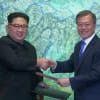Little Rocket Man transforms Korean nuclear narrative

The summit meeting between North Korean leader Kim Jong-un and South Korean President Moon Jae-in at the Peace House at Panmunjom on April 27 was a path-breaking effort to establish lasting peace in the troubled Korean peninsula.
From the video clips it appeared that the ambience of the meeting was amiable. Kim Jong-un's body language seemed relaxed and conciliatory—it was not the defiant audacious face that is projected in Western media. The two leaders embraced each other, were all smiles and exchanged jokes. Pledging a "new era of peace," the leaders signed a 13-point "Declaration for Peace, Prosperity and Unification of the Korean Peninsula" which needs to be looked at carefully.
The highlights of the declaration can be summarised as the following. First, there will be no war in the Korean peninsula. Second, unification of the two Koreas is to be done by the Koreans themselves. Third, allow the divided families to reunite including close cooperation between the peoples of two sides. Fourth, promote balanced economic growth and co-prosperity of the two sides. Fifth, completely cease all hostile acts against each other and transform the demilitarised zone into a zone of peace. Sixth, establish mechanisms for frequent contact between the military authorities to build confidence. Seventh, sign a Non-Aggression Agreement to end the state of war involving China and the United States. Eighth, realise complete denuclearisation of the Korean peninsula. Ninth, frequent meetings between the two leaders to build trust for eventual reunification of the Korean peninsula.
It is pertinent to note that a few days before the summit Kim declared that he was willing to suspend all nuclear and missile tests and dismantle the nuclear test site. But in the declaration there was no mention that Kim intended to do that. It should also be noted here that Republic of Korea is under the US nuclear umbrella and its security is guaranteed by the US-ROK Mutual Defense Treaty signed in 1953. The declaration speaks about complete denuclearisation of the Korean peninsula which, in other words, means that both North and South Korea shall have to shun nuclear weapons. The reunification of the peninsula will be decided by the people of the two Koreas. In other words, no external pressures will be entertained. No time limit has been suggested although it mentions setting up of mechanisms between the two sides to scale down the military tension.
The buildup for the Korean leaders' summit comes in the backdrop of several developments since early this year. First, North Korea, in an apparent softening of position, sent an athletes' delegation to South Korea to participate in the PyeongChang Winter Olympics 2018. US Vice President Mike Pence attended the opening ceremony of the games along with Kim's sister, who led the North Korean delegation. Second, in early March 2018 Donald Trump announced that he would like to meet Kim personally. Over the past year, there has been continuous threats from Donald Trump to invade North Korea with "fire and fury" to destroy its nuclear capability. Yet Kim went ahead and developed nuclear weapons and missiles that are allegedly capable of reaching US mainland. All of this happened under close monitoring of Beijing. The Trump-Kim summit is likely to take place sometime in May 2018. Third, Kim made a secret visit to Beijing (March 26-28, 2018) where he reportedly told Chinese President Xi Jinping that he was open to dialogue with the United States and was committed to denuclearisation of the Korean peninsula. Fourth, ex-CIA director Mike Pompeo secretly visited North Korea in early April 2018 to discuss Kim's nuclear weapons programme and lay the ground for the summit with Donald Trump.
Why has Kim suddenly decided to soften his position? There may be one primary reason for Kim's apparent turnaround. UN sanctions have been playing havoc with the economy. The dwindling economy had a GDP of only USD 28.5 billion in 2016. Much of that was spent on the nuclear and missile programmes leaving very little for the people, who are desperately poor. The country has so far survived because its main trading partner is China. Kim probably realised that economic development was more important at this stage, now that it has the nuclear capability. Kim certainly wants removal of all economic sanctions and to be readmitted into the comity of nations as a normal state.
The reaction from different capitals has been mixed and cautious. Donald Trump, commenting on the outcome of the summit, tweeted, "Korean war to end." Chinese foreign ministry spokesman said, "We applaud the Korean leaders' historic step and appreciate their political decision and courage." Japanese Prime Minister Shinzo Abe who recently visited US to meet Donald Trump welcomed the summit but was rather circumspect saying, "We will keep watching North Korea's future movements." Russian President Vladimir Putin said, "This is very positive news." British Foreign Secretary Boris Johnson was cautious but said, "I am very encouraged by what happened."
The summit declaration was high on hopes and intentions—it actually reflected symbolism. But North Korea's past history does not allow one to be overly optimistic. Similar summits were held between the two Koreas in 2000 and 2007—but nothing much came out of the declarations of those meetings.
However, there is an interesting side to these developments. Wily Kim, the "little rocket man", in spite of leading a very poor nation, has raised himself to the stature of a world leader because of his nuclear capability. He has created a situation where the US president is keenly looking forward to meet him. Indeed with this summit he has Moon Jae-in on his side, which makes him much stronger. Interestingly, even if Kim gives up his nuclear arms—which is unlikely—he is certainly not going to give away the technological knowhow of developing nuclear weapons.
Mahmood Hasan is a former ambassador and secretary of the Bangladesh government.










Comments